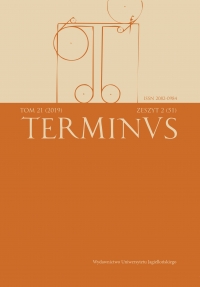Msza przed trybunałem. Personifikacja Mszy w spolszczonym dialogu Bernardina Ochina na tle europejskiej literatury reformacyjnej pierwszej połowy XVI wieku
Mass before the Tribunal. The Personification of the Mass in the Polish Translation of Bernardino Ochino’s Dialogue in the Context of the European Reformation Literature of the First Half of the 16th Century
Author(s): Wojciech KordyzonSubject(s): Christian Theology and Religion, 16th Century, Translation Studies, Stylistics
Published by: Wydawnictwo Uniwersytetu Jagiellońskiego
Keywords: Bernardino Ochino; Mass; Lord’s Supper; personification; Reformation; trial of Mass; dialogue;
Summary/Abstract: The first part of the paper is to introduce the main motif of Bernardino Ochino’s Trajedyja o Mszej (Tragedy on Mass) published in Polish translation in 1560. The work tells the story of a trial of the personified Mass indicted by figures that can be identified with the Reformation and the individuals engaged in it. The Author discusses the structure of this literary dialogue and describes briefly the characters involved in the plot with their polemical background (these include in particular personifications of the Mass, the Lord’s Supper, and the Roman Church, as well as figures of the Pope, Satan, Holy Spirit, and a metonymic protagonist named the Lover of God’s Glory). The second part presents the context of literary tradition, where Mass was personified for controversial purposes, mainly by authors connected with the Reformation. The motif of a personified Mass was probably introduced in Swiss pamphlets of the 1520s (Krankheit und Testament der Messe by Niklaus Manuel, Querela Missae by Johannes Atrocianus). The concept of accusing Mass of dishonesty and performing her trial was recognised as an innovation of English Protestant writings of the late 1540s (esp. William Punt’s and William Turner’s dialogues). The aforementioned texts are juxtaposed with Ochino’s dialogue to show the probable origins of the concept used in his text, as well as to specify additional motifs combined by him (and consequently the Polish translator). The similarities between Ochino’s work and the texts chosen, as well as Ochino’s connections with the places of publication of these texts, allow us to see them as part of a small yet consistent subtype of Protestant polemical writings, which Ochino chose to use and modify for controversial purposes.
Journal: TERMINUS
- Issue Year: 21/2019
- Issue No: 2 (51)
- Page Range: 215-244
- Page Count: 30
- Language: Polish

